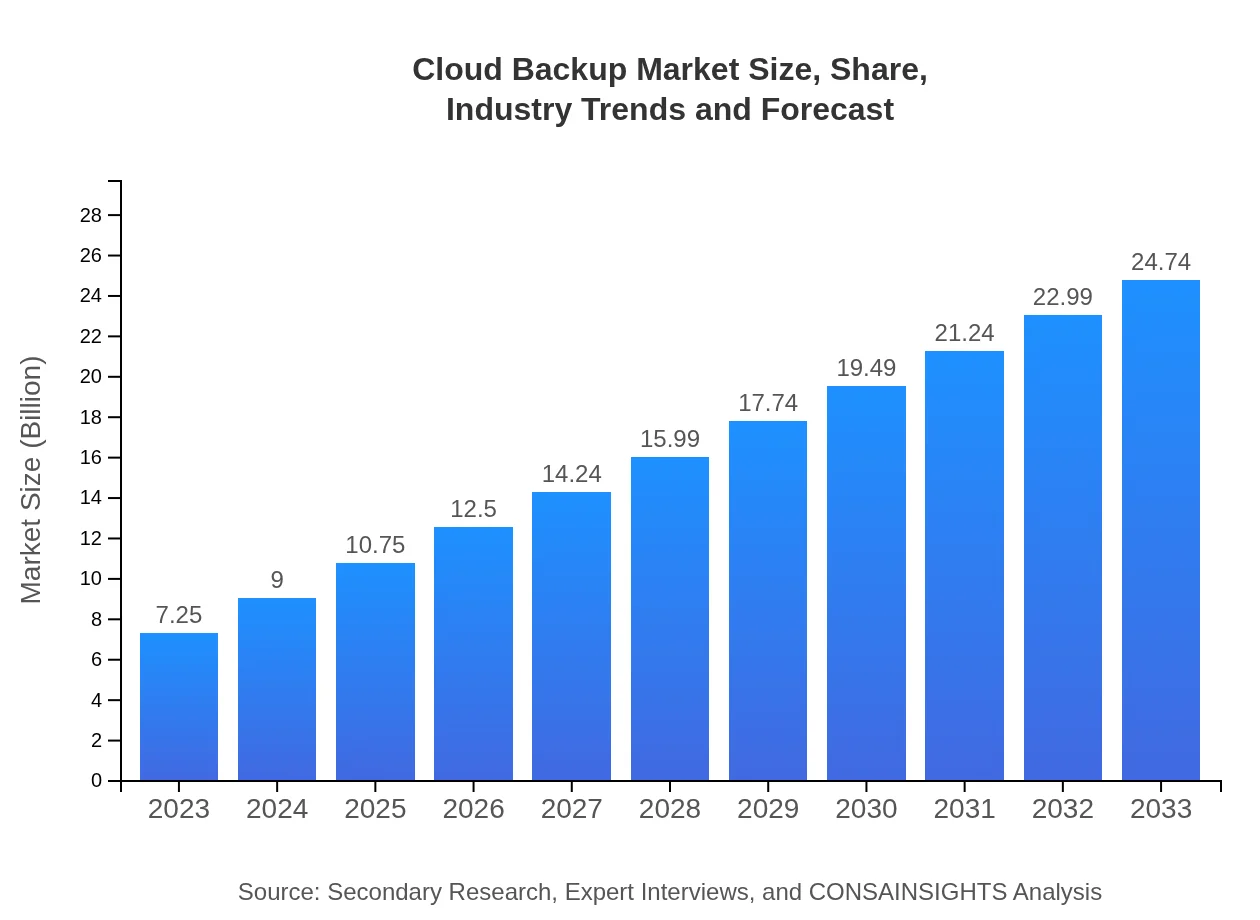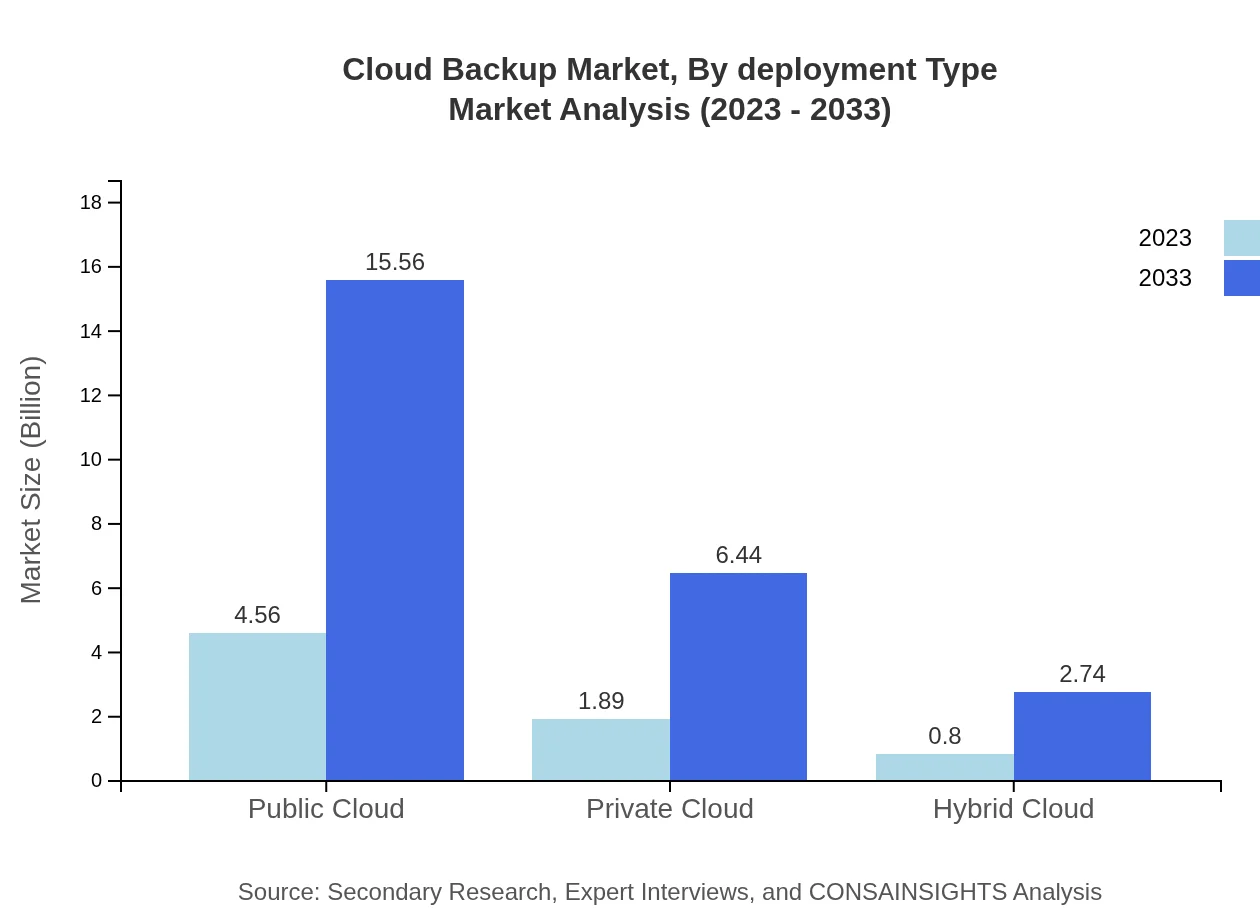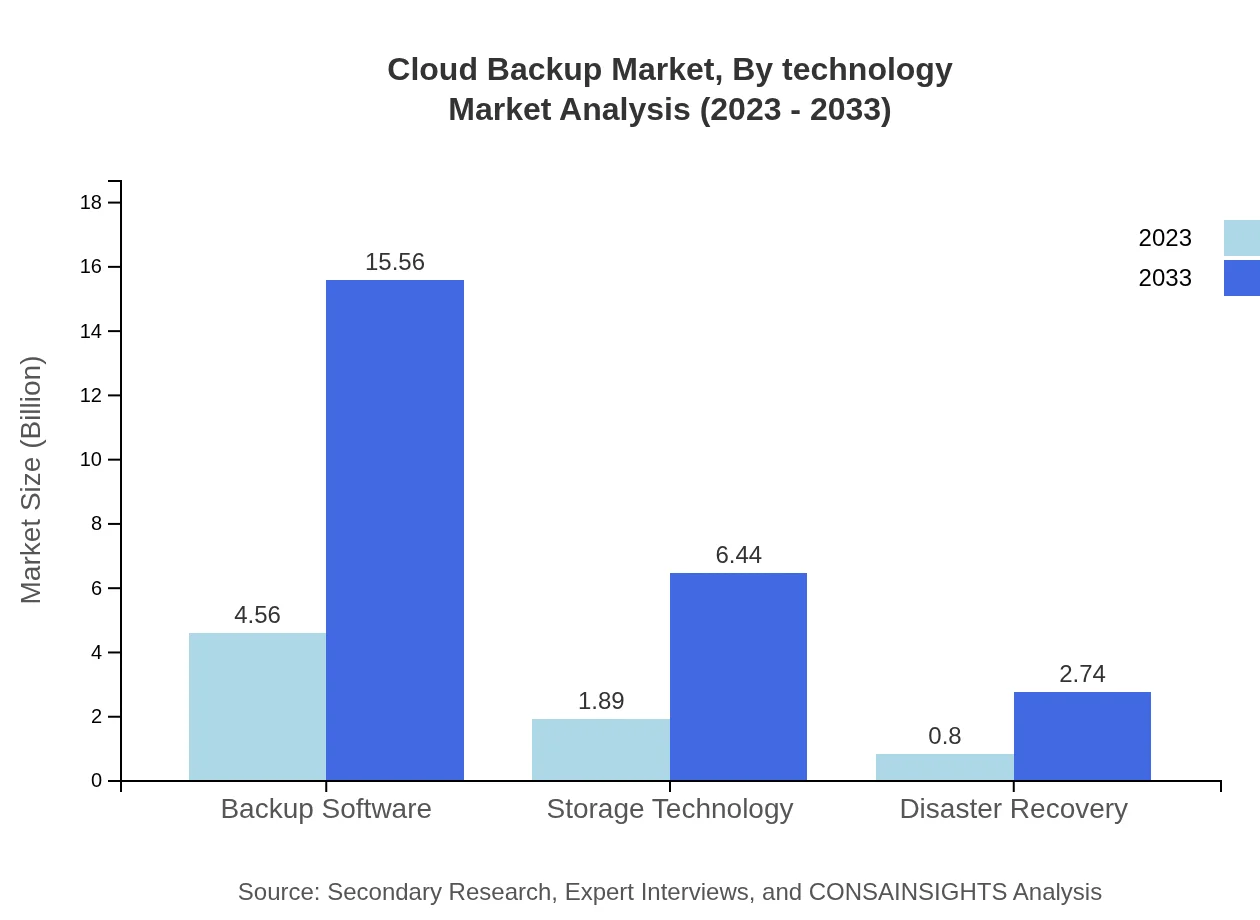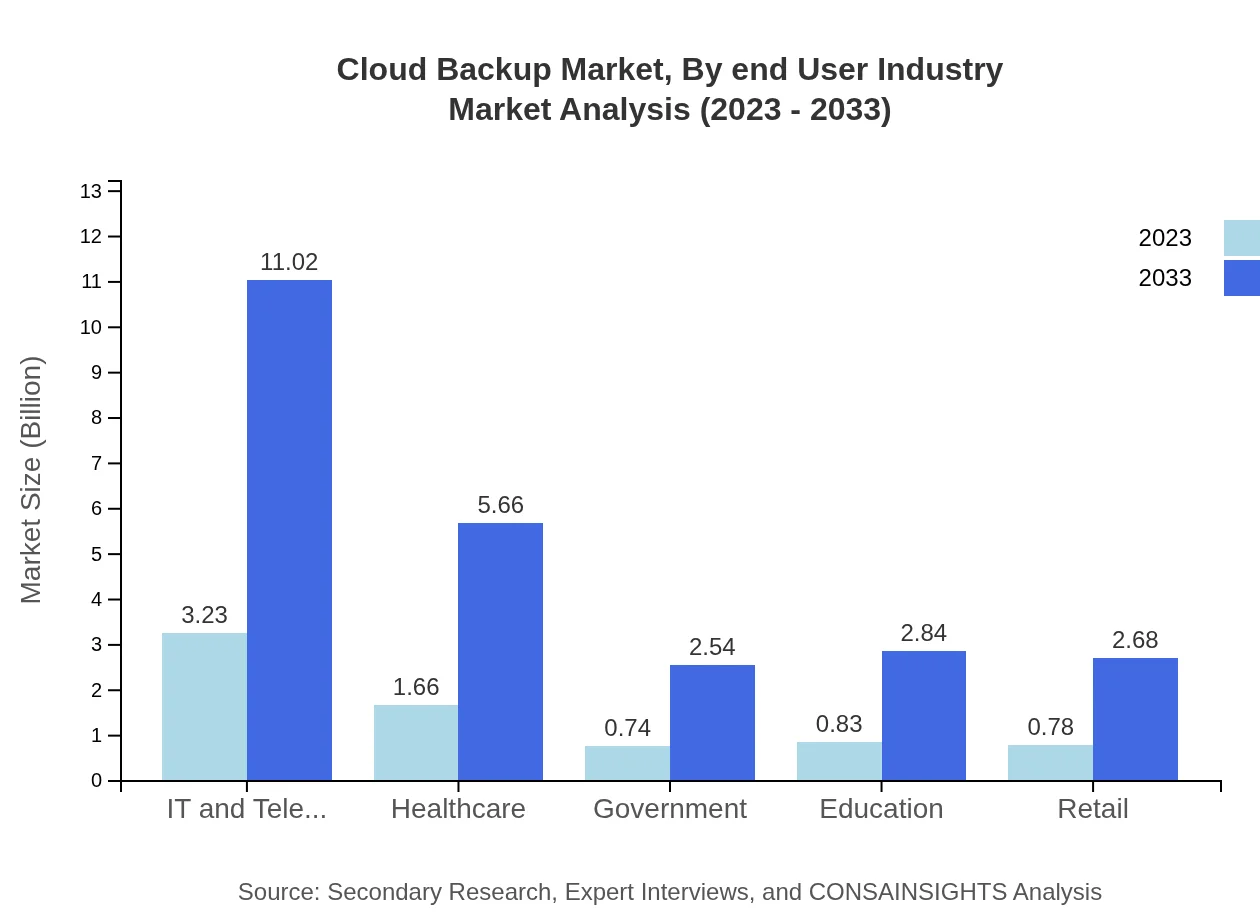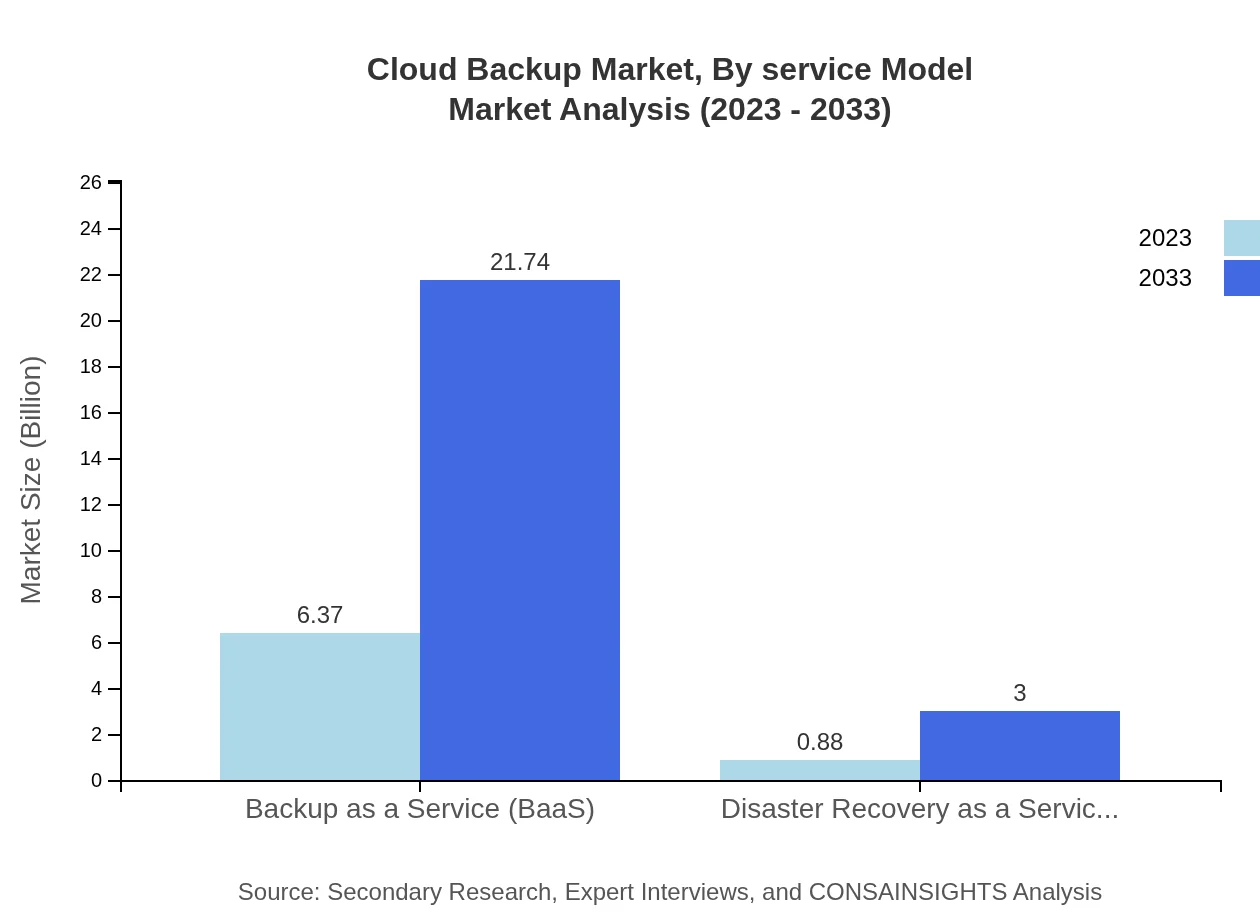Cloud Backup Market Report
Published Date: 31 January 2026 | Report Code: cloud-backup
Cloud Backup Market Size, Share, Industry Trends and Forecast to 2033
This report provides a comprehensive analysis of the Cloud Backup market from 2023 to 2033, detailing market size, trends, and forecasts. Insights on regional performance, technology impacts, market segmentation, and key industry players are also included.
| Metric | Value |
|---|---|
| Study Period | 2023 - 2033 |
| 2023 Market Size | $7.25 Billion |
| CAGR (2023-2033) | 12.5% |
| 2033 Market Size | $24.74 Billion |
| Top Companies | Acronis, Veeam Software, Druva, Commvault, Backblaze |
| Last Modified Date | 31 January 2026 |
Cloud Backup Market Overview
Customize Cloud Backup Market Report market research report
- ✔ Get in-depth analysis of Cloud Backup market size, growth, and forecasts.
- ✔ Understand Cloud Backup's regional dynamics and industry-specific trends.
- ✔ Identify potential applications, end-user demand, and growth segments in Cloud Backup
What is the Market Size & CAGR of Cloud Backup market in 2023?
Cloud Backup Industry Analysis
Cloud Backup Market Segmentation and Scope
Tell us your focus area and get a customized research report.
Cloud Backup Market Analysis Report by Region
Europe Cloud Backup Market Report:
In Europe, the market stood at $2.23 billion in 2023 and is forecasted to grow to $7.61 billion by 2033. The region's strong emphasis on data privacy laws, such as GDPR, pushes organizations towards adopting secure and compliant cloud backup solutions. The growing number of cyber threats has also raised awareness about data security.Asia Pacific Cloud Backup Market Report:
In the Asia Pacific region, the Cloud Backup market was valued at approximately $1.38 billion in 2023 and is expected to grow to $4.72 billion by 2033. The rapid adoption of digital services and an increase in mobile device usage in countries like India and China are significant growth factors. Evolving regulatory frameworks around data protection further prompt businesses to seek cloud backup solutions.North America Cloud Backup Market Report:
North America leads the Cloud Backup market, recorded at $2.48 billion in 2023, with expectations to reach $8.46 billion by 2033. A mature technology landscape, high penetration of cloud services, and stringent data compliance regulations play crucial roles in cementing its position. The presence of major players also fosters innovation and competitive pricing.South America Cloud Backup Market Report:
The South American Cloud Backup market was valued at $0.69 billion in 2023, projected to reach $2.35 billion by 2033. The region is witnessing increasing digital transformation initiatives, especially among medium and small businesses seeking to improve data management capabilities. However, challenges like economic volatility and infrastructural issues may impact growth.Middle East & Africa Cloud Backup Market Report:
The Cloud Backup market in the Middle East and Africa was valued at $0.47 billion in 2023 and is expected to grow to $1.59 billion by 2033. Increasing internet penetration and cloud adoption among enterprises in the region are significant drivers. Moreover, rising concerns over data security and compliance issues with local regulations will lead to greater investment in cloud backup solutions.Tell us your focus area and get a customized research report.
Cloud Backup Market Analysis By Deployment Type
The deployment type segment is crucial, comprising public, private, and hybrid cloud solutions. In 2023, the public cloud segment, representing around $4.56 billion, accounts for 62.89% market share, driven by its cost-effectiveness and scalability. The private cloud market, at $1.89 billion (26.05% share), caters to organizations requiring more control and security, while hybrid cloud solutions ($0.80 billion, 11.06% share) are gaining traction among businesses seeking flexibility.
Cloud Backup Market Analysis By Technology
Technology segmentation includes backup software, storage technologies, and disaster recovery solutions. The backup software segment dominates with a market size of $4.56 billion (62.89% share) in 2023, expected to reach $15.56 billion by 2033. Storage technology follows at $1.89 billion (26.05% share), predicted to grow to $6.44 billion over the same period. Disaster recovery solutions, although smaller at $0.80 billion (11.06% share), are also crucial in aiding businesses in maintaining data integrity during crises.
Cloud Backup Market Analysis By End User Industry
End-user industries such as IT and Telecom, healthcare, and government represent significant segments. The IT and Telecom sector leads with a market size of $3.23 billion (44.54% share) in 2023, projected to reach $11.02 billion by 2033. Healthcare follows with $1.66 billion (22.88% share), reflecting the rising need for data security in managing sensitive information. Government and education sectors are also substantial markets, driven by compliance requirements and data privacy laws.
Cloud Backup Market Analysis By Service Model
Service models include Backup as a Service (BaaS) and Disaster Recovery as a Service (DRaaS). The BaaS segment dominates with a size of $6.37 billion (87.88% share) in 2023, expected to reach $21.74 billion by 2033. DRaaS holds a smaller market presence, valued at $0.88 billion (12.12% share), but is anticipated to grow, reflecting increased recognition of its importance in safeguarding against data loss.
Cloud Backup Market Trends and Future Forecast
Tell us your focus area and get a customized research report.
Global Market Leaders and Top Companies in Cloud Backup Industry
Acronis:
Acronis is a global leader in data protection and hybrid cloud storage solutions, providing innovative backup and recovery services to businesses of all sizes.Veeam Software:
Veeam Software specializes in backup solutions for virtual environments and has a strong presence in the cloud backup market, focusing on high availability and data recovery.Druva:
Druva offers cloud-native data protection solutions that empower organizations to safeguard their data across endpoints and cloud applications.Commvault:
Commvault provides comprehensive data management and protection solutions, focusing on cloud backup, recovery, and compliance services.Backblaze:
Backblaze is known for its user-friendly cloud backup services aimed at individuals and businesses, emphasizing affordability and ease of use.We're grateful to work with incredible clients.









FAQs
What is the market size of cloud Backup?
The global cloud backup market size is projected to reach $7.25 billion by 2033, growing at a CAGR of 12.5% from its current valuation. This growth reflects increasing data security demands and awareness of disaster recovery solutions.
What are the key market players or companies in the cloud Backup industry?
The cloud backup market features key players such as Acronis, Veeam Software, Druva, and IBM. These companies are pioneering advancements in data protection technologies, driving growth and innovation within the industry.
What are the primary factors driving the growth in the cloud Backup industry?
Key drivers of growth in the cloud backup industry include the exponential increase in data generation, need for enhanced cybersecurity, compliance regulations, and the shift towards remote work, necessitating reliable backup solutions.
Which region is the fastest Growing in the cloud Backup?
North America is currently the fastest-growing region in the cloud backup market, projected to grow from $2.48 billion in 2023 to $8.46 billion by 2033. This growth is driven by strong technological adoption and increasing cybersecurity concerns.
Does ConsaInsights provide customized market report data for the cloud Backup industry?
Yes, ConsaInsights specializes in providing customized market reports tailored to the specific needs of clients in the cloud backup industry, ensuring relevant insights and data that align with business strategies.
What deliverables can I expect from this cloud Backup market research project?
Deliverables from the cloud backup market research project include comprehensive data analysis, market forecasts, competitive landscape assessments, segment-wise breakdown, and strategic recommendations based on current trends.
What are the market trends of cloud Backup?
Current trends in the cloud backup market include increasing adoption of Backup as a Service (BaaS), growing hybrid cloud deployments, and a rising focus on security-first backup solutions, shaping the future of data management.

